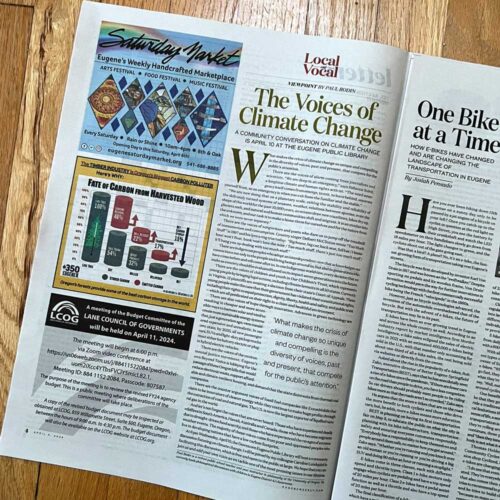
By Paul Bodin
What makes the crisis of climate change so unique and compelling is the diversity of voices, past and present, that compete for the public’s attention.
There are the voices of alarm coming from journalists and scientists. “We are deep in an emergency,” says Rebecca Solnit, a longtime climate and human rights activist. “The word emergency itself comes from emerge, to exit, to leave behind, separate yourself from, so an emergency is when you exit from the familiar and the stable.”
“We are now doing that on a planetary scale, exiting the stability and reliability of the delicately turned systems of seasons, weather, relations between species, even the shape of the world for the past 10,000 years, as oceans draw new coastlines, lakes dry up, glaciers melt, and natural and human communities shift and migrate. It is an exodus into the unknown, and our task is to make a home there for ourselves and for the nature from which we were never separate.”
There are the voices of songwriters and poets who dare us to jump off the treadmill of consumerism and consumption. Country singer Delbert McClinton wrote “Too Much Stuff” in 1997 and his lyrics ring true today: “Big house, big car, back seat, full bar / Houseboat won’t float, bank won’t tote the note / Too much stuff, there’s just too much stuff / It’ll hang you up dealing with too much stuff.”
There are Indigenous peoples who adopt an interdependent view that acknowledges our connections not only to the people and living beings around us, but also to generations who have come before and will come after us. In one Indigenous worldview, every decision that we make as a society should be evaluated based on its impact seven generations into the future.
There are the voices of children and youth in Our Children’s Trust, which represents young people by bringing legal actions, including climate lawsuits in all 50 states. Currently in Virginia, 12 plaintiffs are awaiting a decision from their state’s Court of Appeals. These young people make the case that their government has violated their constitutional rights, including their rights to equal protection, dignity, liberty, health and safety, and public trust — which are all predicated on their right to a clean and healthful environment.
There are also voices of hope through innovation. Advances in green technology are resulting in cheaper and more accessible ways to harness solar and wind to create more sustainable energy systems that, just a generation ago, were considered expensive and unrealistic. In our own state, by 2035, all new passenger cars, SUVs and light-duty pickup trucks must either be battery electric or plug-in hybrid electric vehicles.
There are the voices of the environmental justice movement. Eugene’s own Beyond Toxics is lobbying for the passage of three Oregon bills that would reduce electronic waste, support affordable and climate-resilient housing, and demand that the state disinvests from thermal coal companies.
There are the counter argument voices of fossil fuel companies like ExxonMobile that claim to be innovators of cleaner energy while they continue to make huge profits through the extraction of coal and natural gas. The U.S. is now the largest exporter of liquified natural gas in the world.
And let’s not forget the voices that are never heard: Those who have experienced deadly wildfires in South America, Hawaii, Australia and Canada; those who have become migrants due to drought-driven food scarcity; and those who have experienced the ravages of extreme weather events. The majority of these voices come from poor and oppressed peoples who live in developing nations that have a low carbon footprint.
At 6 pm Wednesday, April 10, the Downtown Eugene Public Library will host a community discussion focusing on climate change. I will be joined by my colleague Caroline Lundquist in facilitating this discussion, which is free and open to the public at large. We hope that you can join us and add your own voice as we tackle one of the most pressing issues in our lifetime.